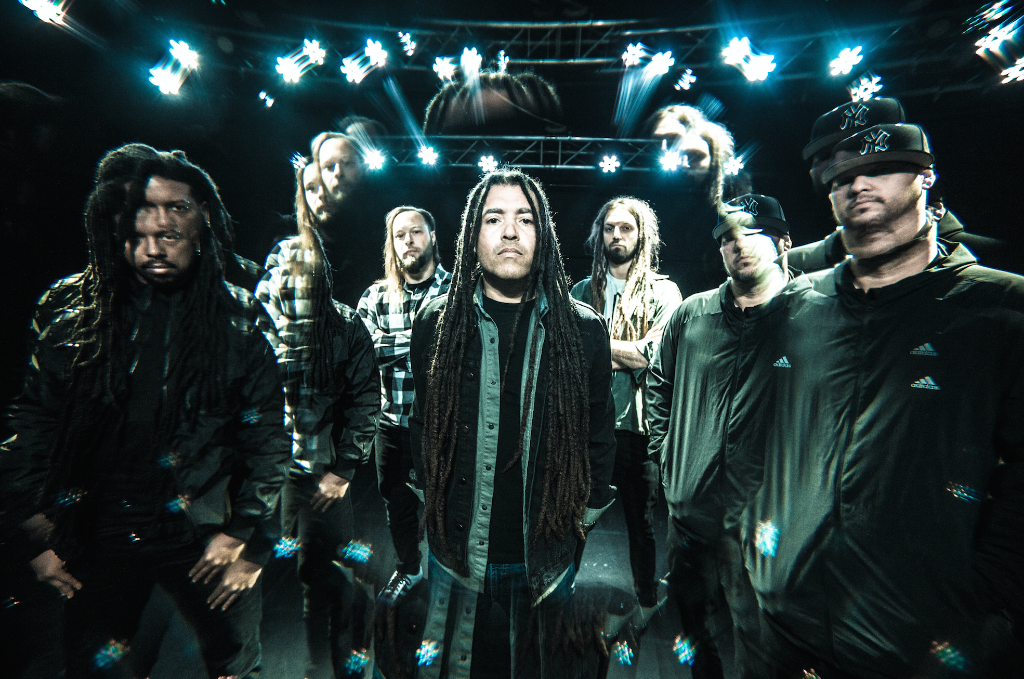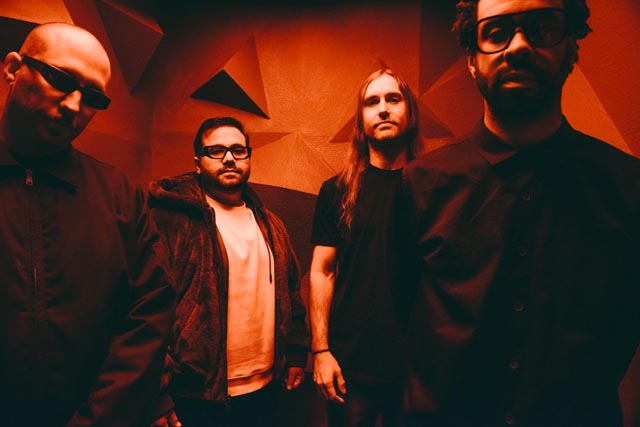
When looking at Nonpoint’s discography, it becomes apparent that some of the Florida band’s album titles appear to be based on where the band was at that point in time (Struggle, Statement, Vengeance, The Return). Singer Elias Soriano confirms that was the case, but says that eventually stopped doing that. With their ninth album and Spinefarm debut, The Poison Red, coming out out on July 8th, Elias, along with guitarists Rasheed Thomas and B.C. Kochmit, sat down with Metal Insider to discuss each album in their discography.
 Struggle (1999)
Struggle (1999)
Elias Soriano: Struggle was local, it was the first South Florida release that sold 2,000 copies that fast. We went through all of them in three weeks.
Do you stand by the quality of the record?
We were a local band and we were still honing our craft of songwriting. We were throwing music out there and hoping for the best.
Were you touring at all?
No, just local. I was already out of college by then, but we were all really young and just wanted to be in a band. There weren’t really any goals on the horizon really. We just wanted to get some songs together and hear what we sounded like when we recorded them. Once we went in, it was someone else that was like “hey, you guys should record a record,” and then that’s when we decided to take it more seriously.
What led to you being signed to MCA? Radio airplay?
Yeah, locally, we were the newer band with the most buzz. So the station at the time was Zeta 94.9 and they asked us to be on their second stage for a festival. Def Leppard headlined, I remember, and we played with our lineup at the time and had a couple of cassette samplers of a couple of the songs, and gave them away for free that day. They immediately went very, very quickly. Our manager at the time, Jason Bieler, said he know a guy at MCA looking to sign bands. Hans Haedelt came down and loved us so much the went back to his bosses and said they needed to sign us.
That didn’t take too long.
No, he let the word out to all the other labels that we were around too. He called Universal, he called Lava and told them that they needed to come check us out even though he was courting us because he wanted to be able to go back to his boss and give us a fair deal.
 Statement (2000) and Development (2002)
Statement (2000) and Development (2002)
That takes us to the MCA years. What was it like signing to a major?
It was 24 months of pretty much nonstop touring. I believe the second year of that run, in one year we had 23 days off. Then MCA started to fold. The majors just started to disappear. And then we went to Lava.
Well there’s also Development in there too.
Yes, Development was the second on MCA. Against the better judgement of my A&R guy, the higher ups were pushing us to write a more mellow kind of record and it started to cause a little bit of turmoil in the relationship. And that’s where the term “development” came from, they wanted to develop us into something that was leaning into another direction. It was a lot of struggle and a lot of opinionated lyrics on that record.
Did you write the record you wanted to write or were you at the whim of the label?
Half and half, I would say. I wrote half the songs I really would’ve wanted to write and then the other half I wasn’t 100% sure of. I was still new to the industry and record labels and the process and everything. It was a lesson learned.
Being on a major label back when people were still actually buying CD’s, did you go from like playing shows locally to being on a tour bus and playing Ozzfest?
No, actually did 18 months in a van. We bought a van, bought a trailer. That thing broke down three times in one month. One time we drove from somewhere in Michigan all the way to Dallas through a snowstorm and it took us an hour and a half to drive 15 miles. And we were on the road for 17 hours non-stop driving so yeah, we definitely paid our dues.
How did your relationship with MCA end?
They sold all their contracts, and we got a deal where they had to buy us out of our contract and pay us to not release our next record. Because of that we went to Lava pretty much debt-free. We were a million and a half in with MCA before they folded, but we were still selling 5,000 records a week so it was good. They knew how to really push and promote and they were a great label. We heard horror stories about MCA from other bands that came in and out, but they adored us and we had a great experience with them.











